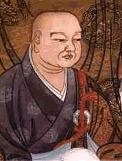Keizan Jōkin
| Keizan Jōkin Zenji | |
|---|---|
 |
|
| Religion | Zen Buddhism |
| School | Sōtō |
| Other names | Taiso Jōsai Daishi |
| Personal | |
| Born | 1268 Japan |
| Died | 1325 (aged 56–57) Japan |
| Senior posting | |
| Title |
Zen Master Daishi |
Keizan Jōkin (Chinese: 瑩山紹瑾, 1268–1325), also known as Taiso Jōsai Daishi, is considered to be the second great founder of the Sōtō school of Zen in Japan. While Dōgen, as founder of Japanese Sōtō, is known as Highest Patriarch (高祖? kōso), Keizan is often referred to as Taiso (太祖) "Great Patriarch".
Keizan and his disciples are credited with beginning the spread of Sōtō Zen throughout Japan, away from the cloistered monastic practice characteristic of Dōgen's Eihei-ji, and towards a more popular religion that appealed to all levels of Japanese society. Keizan founded several temples throughout his lifetime, most notably Yōkō-ji and Daihonzan Sōji-ji (founded on the Noto Peninsula and moved to Tsurumi-ku, Yokohama in 1911). Today Sōji-ji and Eihei-ji stand together as the two principal Sōtō Zen training centers in Japan.
Keizan spent the first eight years growing up under the care of his grandmother, Myōchi, who was one of Great Master Dōgen's first supporters on his return from China. Keizan always acknowledged a great debt to this grandmother by dedicating the Kannon shrine at the temple of Yōkō-ji to her memory.
Keizan also praised his mother very highly in his autobiography, and even said that his mother's wishes and her constant prayers to Kannon had enabled him to become a monk, receive the Dharma transmission and become one of the Soto Zen Ancestors. His mother had become abbess of a Soto monastery, Jōju-ji (成就寺?) and was a teacher in her own right. It seems that his mother had a huge influence both as an example of someone who encouraged the teaching of Buddhism to women and through her emphasis on the power of Kannon, the bodhisattva of compassion.
...
Wikipedia
